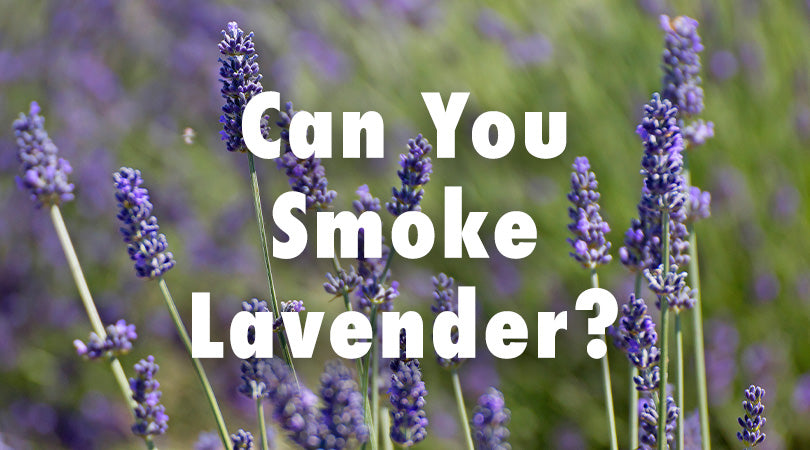
Smoking Lavender: What To Know
Lavender is commonly associated with relaxation and aromatherapy, but can it also be smoked? While not as popular as traditional smoking materials like tobacco and cannabis, lavender has been used in smoking blends for its supposed therapeutic properties. Smoking lavender has a rich history and has been providing people benefits for decades. In this article, we'll explore the history, benefits, and proper preparation of smoking lavender.
History Of Smoking Lavender

Lavender has a long history of use in smoking blends and as a medicinal herb. Historically, lavender was often used in smoking blends to add a pleasant aroma and to mask the smell of other herbs that may have had a less pleasant scent. The ancient Egyptians, Greeks, and Romans all used lavender for its medicinal properties and to add a pleasant aroma to their homes. In the Middle Ages, lavender was used in smoking blends to help mask the smell of burning herbs, which were often used for medicinal and ceremonial purposes. The herb was also believed to have spiritual properties and was used in religious rituals and ceremonies. Additionally, lavender was believed to have medicinal properties and was used to treat a variety of ailments, including anxiety and insomnia. The reasoning behind its use for these purposes is believed to be due to its calming and relaxing properties. The aroma of lavender is believed to help soothe the mind and promote relaxation, while the essential oils found in lavender have been found to have sedative effects on the body. This combination of effects makes lavender an effective natural remedy for anxiety and insomnia.
Smoking lavender is believed to have a number of potential benefits, including promoting relaxation and potentially having anti-inflammatory and antimicrobial properties. The aroma of lavender is believed to help soothe the mind and promote relaxation by activating the limbic system in the brain, which is responsible for regulating emotions. Inhaling the scent of lavender can also help to reduce feelings of stress and anxiety, making it a popular natural remedy for these conditions. Additionally, lavender essential oil has been found to have anti-inflammatory properties, which may make it useful in the treatment of conditions such as arthritis and other inflammatory conditions. The compounds in lavender oil have been found to have a reducing effect on inflammation and pain when applied topically or inhaled. Lavender also has antimicrobial properties, making it useful in the treatment of skin conditions such as acne and eczema. The compounds found in lavender oil have been found to have antimicrobial properties against a variety of bacteria and fungi, making it useful in preventing and treating infections.
Thinking about Risk

While smoking lavender may have potential benefits, there are also potential risks and negative effects to be aware of. One potential risk is the possibility of an allergic reaction. Some individuals may be allergic to lavender and may experience symptoms such as skin rashes, hives, and difficulty breathing when exposed to the herb. If you experience any of these symptoms after smoking lavender, it is important to seek medical attention immediately. Another potential risk is the lack of scientific research on the effects of smoking lavender. While there is some research on the benefits of lavender when inhaled, more research is needed to fully understand the effects of smoking the herb. Additionally, inhaling smoke of any kind can be harmful to your health and smoking lavender is not recommended. It's better to use other methods to consume lavender, such as inhaling its aroma, using essential oils or taking it in capsules or in teas. If you are looking to smoke lavender there are a few steps that are necessary to make sure you have a good experience.
The first step is to harvest the lavender at the right time. You want to harvest lavender in full bloom which generally is in the late spring or early summer. After you harvest the lavender, you should dry and cure the herb.
This process can take some time, up to a few weeks but lavender should be hung upside down in an area out of direct sunlight. You may want to get a grinder to grind up your lavender or you can always use a pestle and mortar but either way it should be ground finely. You will also need a pipe or rolling paper in order to actually smoke the lavender. Once you do all that you should be good to go and ready to smoke your lavender. It should smell similar to fresh lavender but should have a deep, smoky fragrance.
It's important to note that smoking anything, including lavender, carries risk and it's important to consider all factors before making the decision to smoke anything. Smoking is harmful to your health, and it can increase your risk of respiratory problems, cancer, and addiction. Inhaling smoke of any kind can be detrimental to your health, and there is a lack of scientific research on the effects of smoking lavender. Additionally, smoking lavender carries the risk of an allergic reaction, so it's important to be aware of this possibility before smoking the herb. There are also other ways to get the benefits of lavender that don’t include smoking and mitigate those risks found in smoking situations.
Conclusion:

Lavender has a long history of use throughout history and its benefits have been lauded for a long time. The reasoning behind its use for these purposes is believed to be due to its calming and relaxing properties. The aroma of lavender is believed to help soothe the mind and promote relaxation, while the essential oils found in lavender have been found to have sedative effects on the body. However, there are potential risks and negative effects of smoking lavender, such as potential allergic reactions, and the lack of scientific research on its effects when inhaled. Additionally, smoking anything can have negative effects on the health, such as respiratory problems, cancer, and addiction. It is important to do research before smoking anything, especially lavender. While smoking lavender is legal for anyone, it is important to know that any rolling paper that includes tobacco is illegal for anyone under 21 in the United States.
*Content is merely our opinion from the research we have conducted*





